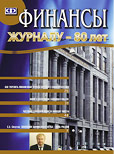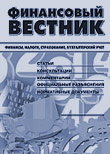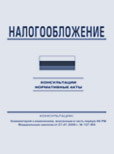Содержание
Актуально
Документ.
На петербургском международном экономическом форуме
E-mail: finance-journal@mail.ru
Изложение выступлений министра финансов РФ А.Г. Силуанова на Петербургском международном экономическом форуме.
Казначейство: становление и развитие
Р.Е. Артюхин, руководитель Федерального казначейства
E-mail: kazna.smi@yandex.ru
Статья посвящена задачам, которые предстоит решать ведомству в текущем году.
Федеральное казначейство активно участвует в реализации задач бюджетной политики, направленных на повышение эффективности системы государственного управления, используя для этого весь набор имеющихся бюджетных инструментов. Кроме того необходимо выстроить современную систему внутреннего государственного финансового контроля, используя для этого риск-ориентированный подход. При этом сами инструменты контроля должны минимизировать риски возникновения повторяющихся бюджетных нарушений.
Ключевые слова: риск-ориентированный подход, механизм казначейского сопровождения, бюджетные кредиты, управление ликвидностью.
Финансовая грамотность
E-mail: finance-journal@mail.ru
Директор департамента международных финансовых отношений Минфина России А.А. Бокарев рассказал о программе финансовой грамотности Министерства финансов Российской Федерации, о промежуточных итогах и планах на будущее.
Ключевые слова: финансовые знания, Всемирный банк, финансовая грамотность.
Финансы и бюджет: проблемы и решения
И.В. Кивико, министр финансов Республики Крым
E-mail: apparat@minfin.rk.gov.ru
В статье подробно рассматриваются источники роста налоговых доходов бюджета региона, к числу которых относятся инвестиции, привлеченные в экономику полуострова, новые рабочие места, увеличение заработной платы, эффективное использование земель и имущества республики, поддержка малого и среднего предпринимательства, и, наконец, совершенствование налогового администрирования.
Ключевые слова: налог на прибыль, налог на доходы физических лиц, акцизы, транспортный налог, налоговые льготы.
Налоги: теория и практика
В.В. Иванов, заведующий кафедрой теории кредита и финансового менеджмента СПбГУ, доктор профессор, доктор экономических наук
E-mail: zlivv@mail.ru
Н.Г. Лукьянова, заместитель председателя комитета финансов Санкт-Петербурга
E-mail: ukyanova@kfin.gov.spb.ru
Н.А. Пытель, ведущий специалист Комитета финансов СПб
E-mail: pytel@kfin.gov.spb.ru
Современная налоговая политика Российской Федерации ориентирована на усиление регулирующей функции налогов. Это находит своё выражение в значительном увеличении количества налоговых льгот и налоговых расходов. На региональном уровне во всех субъектах РФ разработаны и используются нормативные документы по оценке налоговых льгот. Они характеризуются значительным разнообразием трактовок исходных понятий и, как следствие, разнообразием показателей оценки эффективности налоговых льгот. В статье обоснованы направления совершенствования методического обеспечения оценки налоговых льгот и в части упорядочения понятийного аппарата оценки, и в части упорядочения показателей оценки.
Ключевые слова: налогообложение, региональные налоги, налоговые льготы, эффективность, критерии, показатели.
И.А. Майбуров, доктор экономических наук, профессор, заведующий кафедрой финансового и налогового менеджмента, Уральский федеральный университет имени первого Президента России Б.Н. Ельцина, главный научный сотрудник, Дальневосточный федеральный университет
E-mail: mayburov@ustu.ru
Ю.В. Леонтьева, доцент кафедры, кандидат экономических наук
Делается сравнительная оценка фискальной нагрузки на владельцев и пользователей автотранспортных средств в странах Европы и России, и на этой основе обозначаются направления совершенствования системы фискальных инструментов для развития автотранспорта. Утверждается, что Россия имеет не совсем логичную систему транспортных платежей. Высокий уровень постоянных платежей: дестимулирует рост автомобилизации и консервирует существующую структуру автопарка. Низкий уровень переменных платежей (как топливных, так и от дорожной платы) стимулирует интенсивное использование личного автотранспорта. Такой подход формирует у населения устойчивую автомобильную зависимость. Авторы полагают необходимым провести реформу переменных транспортных платежей, прибегая к периодическому повышению акцизов на топливо и расширение дорожной платы.
Ключевые слова: фискальная нагрузка, транспортные платежи, автомобилизация населения.
Страхование
Ю.А. Сплетухов, доцент Финансового университета при Правительстве РФ, ведущий научный сотрудник НИФИ Минфина России, кандидат экономических наук
E-mail: spletuhov@mail.ru
Автор пишет о том, что перестрахование является той сферой страховой деятельности, где интеграционные процессы в рамках ЕАЭС могли бы осуществляться более быстрыми темпами, а формирование общей перестраховочной емкости государств – членов ЕАЭС могло бы выступить в качестве одного из первоочередных проектов. Он описывает различные пути построения такой емкости, прежде всего – выработку общих правил регулирования перестраховочной деятельности в странах-членах ЕАЭС.
Ключевые слова: евразийская интеграция, страховое законодательство, трансграничное перестрахование, рейтинги, пруденциальные нормативы, общая перестраховочная емкость.
Беседа с доктором П. Мюллером
E-mail: finance-journal@mail.ru
Редактор журнала «Финансы» Э.С. Гребенщиков провел беседу на заявленную тему с доктором П. Мюллером (г. Баден, Австрия), который почти два десятилетия возглавлял представительство Мюнхенского перестраховочного общества в России и странах СНГ. Идею и концепцию страхования роботов (РОБО - КАСКО и РОБО – ответственность) немецкий эксперт разрабатывает (с некоторыми перерывами) с 2003 г. Сейчас эта тема приобрела особенно большую актуальность в связи с широким применением роботов (а также искусственного интеллекта) на производстве и в других сферах, расширением их функциональных возможностей. С одной стороны, роботы, которые уже не отделены от человека, как ранее, травмоопасны, сами служат источником риска для работников, действующих в тесном контакте с ними. Доктор П. Мюллер подробно разбирает и вопрос о том, кого именно считать причинителем ущерба, если робот нанес ущерб здоровью или жизни.
Ключевые слова: робототехника, страхование ответственности эксплуатантов и собственников, виды ущерба, РОБО-КАСКО, новый сегмент страхового рынка, уменьшение риска и контроль за его возникновением.
Финансы социальной сферы
А.К. Соловьев, доктор экономических наук, профессор Финансового университета при Правительстве РФ
E-mail: NSorochkina@100.pfr.ru
Автор разбирает причины дефицита бюджета ПФР, рассматривает предпринятые меры для его преодоления, предлагает собственное видение решения этой проблемы.
Ключевые слова: прожиточный минимум пенсионера, страховая пенсия по старости, солидарно-распределительный механизм, индивидуально-накопительный механизм.
Финансовые рынки
Р.К. Нурмухаметов, доцент кафедры «Финансы и кредит» Тульского филиала Финансового университета при Правительстве Российской Федерации, кандидат экономических наук
E-mail: nurmuhametov.rim@yandex.ru
В статье рассматривается эволюция взглядов на природу финансового рынка, отраженных в российском законодательстве, различных нормативных актах, а также в научных публикациях. Рассмотрены три основные точки зрения на природу финансового рынка. По мнению автора, сущность финансового рынка проявляется, не только в предмете сделок на этом рынке, но и в характеристике субъектов рынка, а также в таких свойствах финансового рынка как доступность финансовых услуг, уровень доверия, риск, ликвидность, устойчивое/неустойчивое состояние рынка.
Ключевые слова: финансовый рынок, мегарегулятор, финансовые институты.
Информация
Информация о заседании, состоявшемся 23 мая т.г. Его темой стала «Интернет-торговля ювелирными изделиями. Проблемы доставки товара посредством почтовых отправлений.
Проф. А.П. Архипов (aarkhipoff@yandex.ru) поделился своими наблюдениями об итогах IV межвузовского семинара в г. Грозном, проведенного совместными усилиями местного нефтяного университета и министерства финансов ЧР.
Ключевые слова: региональные страховые компании и банки, неравная конкуренция, институциональная структура, участники финансового рынка.
Annotation
The document.
E-mail: finance-journal@mail.ru
Review of speeches of the Minister of Finance of the Russian Federation A.G. Siluanov at the St. Petersburg International Economic Forum.
R.E. Artyukhin, head of the Federal Treasury.
E-mail: kazna.smi@yandex.ru
Article is devoted to the tasks which will be solved by the department in current year.
Federal Treasury is actively involved into implementation of the tasks of budget policy aimed at improving the efficiency of public administration system using the entire set of available budget instruments. Additionally it’s necessary to establish a modern system of internal state financial control using a risk – oriented approach. Moreover, these instruments of control should minimise the risks of repeated budget breaches.
Keywords: risk – oriented approach, mechanism of the Treasury support, budget credits, liquidity management.
E-mail: finance-journal@mail.ru
Director of the Department of International Financial Relations of the Ministry of Finance of Russia A.A. Bokarev told about the financial literacy program of the Ministry of Finance of the Russian Federation, about the intermediate results and plans for future.
Keywords: financial knowledge, World Bank, financial literacy.
I.V. Kiviko, Minister of Finance of the Republic of Crimea
E-mail: apparat@minfin.rk.gov.ru
Article in detail considers the sources of growth in tax revenues of the region’s budget, including the investments attracted into the economy of the peninsula, new jobs, increase of salaries, effective use of land and property of the Republic, support of small and medium enterprises and finally improvement of tax administration.
Keywords: tax on profit, tax on incomes of physical persons, excise, transport tax, tax benefits.
V.V. Ivanov, head of chair “Credit theory and financial management” of the St. Petersburg State University, doctor professor, doctor of economic sciences.
E-mail: zlivv@mail.ru
N.G. Lukyanova, deputy chairperson of the Finance Committee of St. Petersburg.
E-mail: ukyanova@kfin.gov.spb.ru
N.A. Pytel, leading specialist of the Finance Committee of St. Petersburg.
E-mail: pytel@kfin.gov.spb.ru
Contemporary tax policy of the Russian Federation is oriented on increasing regulating function of taxes. This results in enormous increase in the number of tax benefits and tax expenses. Each regional entity has elaborated and uses legal documents including standards for estimating tax benefits. These regional documents are characterized by wide range of definitions for basic categories and, as a result, by variety of indicators for estimating effectiveness of tax benefits. Trends in improving methodics providing estimation of tax benefits as well as putting in order appropriate definitions and indicators of that estimation are revealed in the article.
Keywords: taxation, regional taxes, tax benefits, effectiveness, criteria, indicators.
I.A. Mayburov, doctor of economic sciences, professor, head of chair of Financial and Tax Management of the Ural Federal University named after the first President of Russia B.N. Yeltsin, senior research officer, Far Eastern Federal University.
E-mail: mayburov@ustu.ru
Y.V. Leontyeva, associate professor of chair, candidate of economic sciences.
The purpose of this article is to compare the fiscal burden on car owners and car users in the countries of Europe and in Russia and to use the findings for identifying areas of improvement in the system of fiscal instruments under the present conditions of transport development. A conclusion is made that in Russia, the system of transport payments lacks logic. The level of fixed taxes that is rather higher for Russia generates two effects: it hinders the growth of car ownership and preserves the negative structure of the car fleet. The low level of variable taxes (fuel tax and tolls) encourages the intense use of passenger cars. The approach will spur further growth of car ownership rates in Russia, making people car dependent. A reform of variable transport taxes is needed to regularly increase them. Such an increase should also be accomplished by regularly increasing fuel excise duties and introducing congestion charges and toll charges on more roads, bridges, tunnels, and conservation areas.
Keywords: fiscal burden, transport payments, car ownership rates.
Y.A. Spletuhov, associate professor of the Financial University under the Government of the Russian Federation, leading research officer of the Financial Research Institute of the Ministry of Finance of Russia, candidate of economic sciences.
E-mail: spletuhov@mail.ru
Author writes about the fact that reinsurance is the sphere of insurance activities where the integration process within the frameworks of EAEU could be carried out more rapidly and formation of the overall reinsurance capacity of the states – members of EAEU could serve as one of priority projects. He describes different the ways for construction of this capacity, especially - the development of common rules of reinsurance activities in the states – members of EAEU.
Keywords: Eurasian integration, insurance law, cross – border reinsurance, ratings, prudential standards, general reinsurance capacity.
Conversation with doctor P. Muller
E-mail: finance-journal@mail.ru
The editor of the “Finance” journal E.S. Grebenshchikov held a conversation on stated topic with doctor P. Muller (Baden, Austria), who headed the representative office of Munich reinsurance society in Russian and CIS countries for almost 2 decades. German expert started to develop (with some breaks) the idea and concept of robot’s insurance (ROBO – CASCO and ROBO - responsibility) in 2003. By now this theme became particularly relevant in connection with the wide application of robots (and artificial intelligence) in manufacturing and other spheres, expanding its functional opportunities. From one side robots not separated from human as previously are traumatic and serve as a source of risks for workers operating in close contact with them. Doctor P. Muller in detail examines the question who will be considered the causer of damage if robot caused damage to health or life.
Keywords: robotics, insurance of responsibility of operators and owners, types of harm, ROBO – CASCO, new segment of insurance market, reduction of risk and control over its emergence.
A.K. Soloviev, doctor of economic sciences, professor of the Financial University under the Government of the Russian Federation.
E-mail: NSorochkina@100.pfr.ru
Author examines the reasons of PFR’s budget deficit, considers measures for its overcoming, offers his own solution of this problem.
Keywords: subsistence minimum of pensioner, insurance pension for old age, solidary – distribution mechanism, individually – accumulation mechanism.
R.K. Nurmuhametov, associate professor of chair “Finance and credit” of the Tula branch of the Financial University under the Government of the Russian Federation, candidate of economic sciences.
E-mail: nurmuhametov.rim@yandex.ru
The article examines the evolution of views on the nature of the financial market, reflected in Russian legislation, various regulatory acts, as well as in scientific publications. Three main points of view on the nature of the financial market are considered. According to the author, the essence of the financial market is manifested, not only in the subject of transactions in this market, but also in the characteristics of market participants, as well as in such properties of the financial market as the availability of financial services, confidence level, risk, liquidity, stable / unstable market conditions.
Keywords: financial market, mega regulator, financial institutions.
Information about the meeting held on 23 May 2017. The theme of this event was – “Internet trade of jewelry. Problems of delivery of goods by mail”.
Professor A.P. Arkhipov (aarkhipoff@yandex.ru) shared his observations about the results of the IV interuniversity seminar in Grozny conducted jointly by the local University of Oil and Ministry of Finance of the Republic of Chechnya.
Keywords: regional insurance companies and banks, unequal competition, institutional structure, financial market participants.











